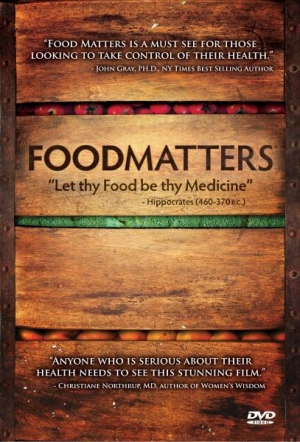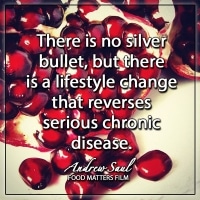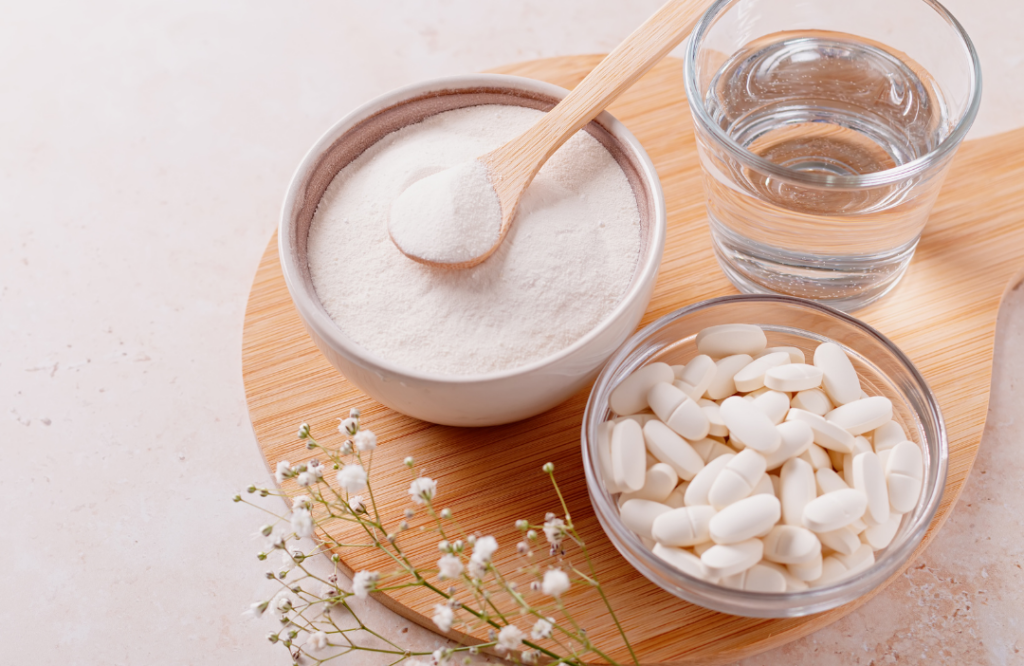3 Ways Food Matters Changed My Life
Published on March 24, 2015 by Dr. Caitlin Gordon
Food Matters Movie Review

I watched this documentary back in my master’s program, and want to share what I learned, and how it inspired me. First, I really enjoyed this movie. While I noticed a clear bias toward raw food, the movie was never pretending to be something other than it was: support of plant-based nutrition to heal as opposed to pharmaceuticals. I disagree that animal protein causes disease and higher mortality when factors such as vegetable consumption, exercise, and quality (organic, grass-fed, non-GMO) factors are controlled for. However, there were so many interesting tidbits that I had not previously heard about and that I went on to further research after the film ended. This is ultimately what inspiration is all about: piquing curiosity, spurring action. Some examples of things I didn’t know and looked further into:
- Megadose Vitamin C for cancer treatment
- Mega dose Niacin for depression
- The immune response prompted by consumption of cooked foods
More on that last topic below.
Impact on me:
1. I started drinking a liter of water every morning since watching the movie.
Water is almost as important as the hype makes it out to be. Drink a lot early in the day. Help your system flush waste products out, then lay off in the evenings so you aren’t waking up to pee.
2. I have been more motivated to eat seasonally.
Food Matters reminded me the nutrition in food (even if organic) that has been shipped and sitting in the grocery store for weeks is a fraction of that with freshly harvested produce. I am buying certain out- of-season vegetables frozen to get a higher value nutritional value (spinach, berries).
3. I am eating more of my fruits and veggies raw on warm days.
 This part really got my attention because in Traditional Chinese Medicine we so often recommend people lightly steam most of their produce. I did quite a bit of research on this since watching the film and here is what I have concluded: The Food Matters film didn’t specify that the research it was referring to when it talks about cooked food causing an immune reaction was specific to cooked refined sugars and flours and meat at very high temperatures. I read up on cooking times and various foods and it seems that the white blood cell response is observed when we eat baked bread and sweet products. Roasted root vegetables, while lower in nutrition than raw, do not cause our bodies to view them as foreign invaders. The fact that cooked wheat products cause GI immune reaction may be one reason why gluten intolerance is so prevalent. Even though the film doesn’t talk about this specifically, it clearly is the immune response that occurs when we eat a lot of bread products. According to the research, any refined flour cooked at high temperature will cause this response in our systems.
This part really got my attention because in Traditional Chinese Medicine we so often recommend people lightly steam most of their produce. I did quite a bit of research on this since watching the film and here is what I have concluded: The Food Matters film didn’t specify that the research it was referring to when it talks about cooked food causing an immune reaction was specific to cooked refined sugars and flours and meat at very high temperatures. I read up on cooking times and various foods and it seems that the white blood cell response is observed when we eat baked bread and sweet products. Roasted root vegetables, while lower in nutrition than raw, do not cause our bodies to view them as foreign invaders. The fact that cooked wheat products cause GI immune reaction may be one reason why gluten intolerance is so prevalent. Even though the film doesn’t talk about this specifically, it clearly is the immune response that occurs when we eat a lot of bread products. According to the research, any refined flour cooked at high temperature will cause this response in our systems.
When I researched nutrition value of fruits and vegetables when cooked, I discovered that some vegetables lose a lot of nutrition, but some actually have more nutritional value when cooked (like tomatoes), or have higher values of certain nutrients whether eaten raw or cooked. This makes me believe that most people should aim to eat their fruits and veggies half raw and half cooked, with more raw during summer and less raw during winter. This makes sense seasonally and will allow for greatest nutrient utilization. If you have a compromised digestive system, it makes sense to eat more cooked food so that energy isn’t being sapped trying to break down raw food in an inflamed system. However, this is only a short-term recommendation until the digestive tract is in better condition.
This review is part of the Get-Inspired Series and How To Change The Way You Eat!
Order Food Matters DVD on Amazon
Get Nutritional Counseling from a Traditional Chinese Medicine perspective.






